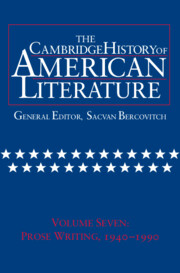Book contents
- Frontmatter
- Introduction
- The Drama, 1940—1990
- Fiction and Society, 1940–1970
- After the Southern Renascence
- 1 Introduction
- 2 Robert Penn Warren
- 3 Carson McCullers
- 4 Flannery O’Connor
- 5 Eudora Welty
- 6 Novels of Race and Class
- 7 Novels of Slavery and Reconstruction
- 8 Walker Percy
- 9 Reynolds Price
- 10 Peter Taylor
- Postmodern Fictions, 1960–1990
- Emergent Literatures
- Appendix: Biographies
- Chronology, 1940–1990
- Bibliography
- Index
9 - Reynolds Price
from After the Southern Renascence
Published online by Cambridge University Press: 28 March 2008
- Frontmatter
- Introduction
- The Drama, 1940—1990
- Fiction and Society, 1940–1970
- After the Southern Renascence
- 1 Introduction
- 2 Robert Penn Warren
- 3 Carson McCullers
- 4 Flannery O’Connor
- 5 Eudora Welty
- 6 Novels of Race and Class
- 7 Novels of Slavery and Reconstruction
- 8 Walker Percy
- 9 Reynolds Price
- 10 Peter Taylor
- Postmodern Fictions, 1960–1990
- Emergent Literatures
- Appendix: Biographies
- Chronology, 1940–1990
- Bibliography
- Index
Summary
Reynolds Price has distinguished himself as a writer of short stories, as a playwright, as a poet, as a biblical translator, as an essayist and critic, and as a memoirist, but it is on his novels that his reputation hangs. Because the middle 1990s are the peak of his career, it is hazardous to make claims about the shape of his work, but his twenty-seven books over the last thirty-odd years have shown a powerful consistency in their aesthetic and in their governing concerns. Whether Price will be the last of the great novelists of the Southern Renascence tradition depends chiefly on who follows him, but his proudly old-fashioned practice of the Southern novel, always traditional but never derivative, places his work squarely and unapologetically in Southern fiction’s main line of descent. The inheritance of Southern fiction’s in some way resembles the inheritance of the burdened and entangled family histories it so often describes, but if Price is the last of a dynasty, he never, perhaps uncharacteristically in Southern dynastic stories, thinks of himself as the troubled and ironic heir of a legacy he both loves and fears. Walker Percy, like his own Will Barrett, and Peter Taylor, like his own Phillip Carver, see themselves as comically or wistfully belated. Neither Price nor his own Hutchins Mayfield, however, proud as they are of their ability to render keen and complex judgements, think of themselves as latecomers in any way; indeed, both rather hardheadedly insist that the traditional resources at their disposal are fully up to the exigencies of the present day.
- Type
- Chapter
- Information
- The Cambridge History of American Literature , pp. 405 - 420Publisher: Cambridge University PressPrint publication year: 1999

